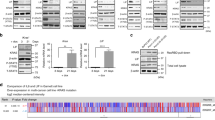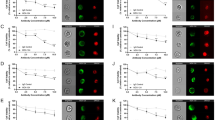Abstract
AXL receptor tyrosine kinase (RTK) is implicated in proliferation and invasion of many cancers, particularly in pancreatic ductal adenocarcinoma (PDAC), for which new therapeutic options are urgently required. We investigated whether inhibition of AXL activity by specific monoclonal antibodies (mAbs) is efficient in limiting proliferation and migration of pancreatic cancer cells. Expression of AXL was evaluated by immunohistochemistry in 42 PDAC. The AXL role in oncogenesis was studied using the short hairpin RNA approach in a pancreatic carcinoma cell line. We further generated antihuman AXL mAbs and evaluated their inhibitory effects and the AXL downstream signaling pathways first in vitro, in a panel of pancreatic cancer cell lines and then in vivo, using subcutaneous or orthotopic pancreatic tumor xenografts. AXL receptor was found expressed in 76% (32/42) of PDAC and was predominantly present in invasive cells. The AXL-knockdown Panc-1 cells decreased in vitro cell migration, survival and proliferation, and reduced in vivo tumor growth. Two selected anti-AXL mAbs (D9 and E8), which inhibited phosphorylation of AXL and of its downstream target AKT without affecting growth arrest-specific factor 6 (GAS6) binding, induced downexpression of AXL by internalization, leading to an inhibition of proliferation and migration in the four pancreatic cancer cell lines studied. In vivo, treatment by anti-AXL mAbs significantly reduced growth of both subcutaneous and orthotopic pancreatic tumor xenografts independently of their KRAS mutation status. Our in vitro and preclinical in vivo data demonstrate that anti-human AXL mAbs could represent a new approach to the pancreatic cancer immunotherapy.
This is a preview of subscription content, access via your institution
Access options
Subscribe to this journal
Receive 50 print issues and online access
$259.00 per year
only $5.18 per issue
Buy this article
- Purchase on Springer Link
- Instant access to full article PDF
Prices may be subject to local taxes which are calculated during checkout






Similar content being viewed by others
References
Nelson NJ . Pancreatic Cancer Research Matures. J Natl Cancer Inst 2007; 99: 1432–1434.
Beck A, Wurch T, Bailly C, Corvaia N . Strategies and challenges for the next generation of therapeutic antibodies. Nat Rev Immunol 2010; 10: 345–352.
Vanneman M, Dranoff G . Combining immunotherapy and targeted therapies in cancer treatment. Nat Rev Cancer 2012; 12: 237–251.
Kim EJ, Simeone DM . Advances in pancreatic cancer. Curr Opin Gastroenterol 2011; 27: 460–466.
Jones S, Zhang X, Parsons DW, Lin JC, Leary RJ, Angenendt P et al. Core signaling pathways in human pancreatic cancers revealed by global genomic analyses. Science 2008; 321: 1801–1806.
Wong HH, Lemoine NR . Pancreatic cancer: molecular pathogenesis and new therapeutic targets. Nat Rev Gastroenterol Hepatol 2009; 6: 412–422.
Linger RMA, Keating AK, Earp HS, Graham DK . TAM receptor tyrosine kinases: biologic functions, signaling, and potential therapeutic targeting in human cancer. Adv Cancer Res 2008; 100: 35–83.
Verma A, Warner SL, Vankayalapati H, Bearss DJ, Sharma S . Targeting axl and mer kinases in cancer. Mol Cancer Ther 2011; 10: 1763–1773.
Liu E, Hjelle B, Bishop JM . Transforming genes in chronic myelogenous leukemia. Proc Natl Acad Sci USA 1988; 85: 1952–1956.
Linger RM, Keating AK, Earp HS, Graham DK . Taking aim at Mer and Axl receptor tyrosine kinases as novel therapeutic targets in solid tumors. Expert Opin Ther Targets 2010; 14: 1073–1090.
Koorstra JBM, Karikari CA, Feldmann G, Bisht S, Rojas PL, Offerhaus GJA et al. The Axl receptor tyrosine kinase confers an adverse prognostic influence in pancreatic cancer and represents a new therapeutic target. Cancer Biol Ther 2009; 8: 618–626.
Song X, Wang H, Logsdon CD, Rashid A, Fleming JB, Abbruzzese JL et al. Overexpression of receptor tyrosine kinase Axl promotes tumor cell invasion and survival in pancreatic ductal adenocarcinoma. Cancer 2011; 117: 734–743.
Gjerdrum C, Tiron C, Høiby T, Stefansson I, Haugen H, Sandal T et al. Axl is an essential epithelial-to-mesenchymal transition-induced regulator of breast cancer metastasis and patient survival. Proc Natl Acad Sci USA 2010; 107: 1124–1129.
Vuoriluoto K, Haugen H, Kiviluoto S, Mpindi J-P, Nevo J, Gjerdrum C et al. Vimentin regulates EMT induction by Slug and oncogenic H-Ras and migration by governing Axl expression in breast cancer. Oncogene 2011; 30: 1436–1448.
Hong C-C, Lay J-D, Huang J-S, Cheng A-L, Tang J-L, Lin M-T et al. Receptor tyrosine kinase AXL is induced by chemotherapy drugs and overexpression of AXL confers drug resistance in acute myeloid leukemia. Cancer Lett 2008; 268: 314–324.
Gioia R, Leroy C, Drullion C, Lagarde V, Etienne G, Dulucq S et al. Quantitative phosphoproteomics revealed interplay between Syk and Lyn in the resistance to nilotinib in chronic myeloid leukemia cells. Blood 2011; 118: 2211–2221.
Mahadevan D, Cooke L, Riley C, Swart R, Simons B, Croce KD et al. A novel tyrosine kinase switch is a mechanism of imatinib resistance in gastrointestinal stromal tumors. Oncogene 2007; 26: 3909–3919.
Liu L, Greger J, Shi H, Liu Y, Greshock J, Annan R et al. Novel mechanism of lapatinib resistance in HER2-positive breast tumor cells: activation of AXL. Cancer Res 2009; 69: 6871–6878.
Macleod K, Mullen P, Sewell J, Rabiasz G, Lawrie S, Miller E et al. Altered ErbB receptor signaling and gene expression in cisplatin-resistant ovarian cancer. Cancer Res 2005; 65: 6789–6800.
Lay J-D, Hong C-C, Huang J-S, Yang Y-Y, Pao C-Y, Liu C-H et al. Sulfasalazine suppresses drug resistance and invasiveness of lung adenocarcinoma cells expressing AXL. Cancer Res 2007; 67: 3878–3887.
Li Y, Ye X, Tan C, Hongo J-A, Zha J, Liu J et al. Axl as a potential therapeutic target in cancer: role of Axl in tumor growth, metastasis and angiogenesis. Oncogene 2009; 28: 3442–3455.
Larbouret C, Robert B, Navarro-Teulon I, Thèzenas S, Ladjemi M-Z, Morisseau S et al. In vivo therapeutic synergism of anti–epidermal growth factor receptor and anti-HER2 monoclonal antibodies against pancreatic carcinomas. Clin Cancer Res 2007; 13: 3356–3362.
Trédan O, Galmarini CM, Patel K, Tannock IF . Drug resistance and the solid tumor microenvironment. J Natl Cancer Inst 2007; 99: 1441–1454.
Troiani T, Martinelli E, Capasso A, Morgillo F, Orditura M, De Vita F et al. Targeting EGFR in pancreatic cancer treatment. Curr Drug Targets 2012; 13: 802–810.
Byers LA, Diao L, Wang J, Saintigny P, Girard L, Peyton M et al. An epithelial–mesenchymal transition gene signature predicts resistance to EGFR and PI3K inhibitors and identifies axl as a therapeutic target for overcoming EGFR inhibitor resistance. Clin Cancer Res 2013; 19: 279–290.
Thiery JP, Acloque H, Huang RYJ, Nieto MA . Epithelial-mesenchymal transitions in development and disease. Cell 2009; 139: 871–890.
Krantz SB, Shields MA, Dangi-Garimella S, Munshi HG, Bentrem DJ . Contribution of epithelial-to-mesenchymal transition and cancer stem cells to pancreatic cancer progression. J Surg Res 2012; 173: 105–112.
Tai K-Y, Shieh Y-S, Lee C-S, Shiah S-G, Wu C-W . Axl promotes cell invasion by inducing MMP-9 activity through activation of NF-κB and Brg-1. Oncogene 2008; 27: 4044–4055.
Rankin EB, Fuh KC, Taylor TE, Krieg AJ, Musser M, Yuan J et al. AXL is an essential factor and therapeutic target for metastatic ovarian cancer. Cancer Res 2010; 70: 7570–7579.
Clynes RA, Towers TL, Presta LG, Ravetch JV . Inhibitory Fc receptors modulate in vivo cytoxicity against tumor targets. Nat Med 2000; 6: 443–446.
Cartron G, Dacheux L, Salles G, Solal-Celigny P, Bardos P, Colombat P et al. Therapeutic activity of humanized anti-CD20 monoclonal antibody and polymorphism in IgG Fc receptor FcγRIIIa gene. Blood 2002; 99: 754–758.
Musolino A, Naldi N, Bortesi B, Pezzuolo D, Capelletti M, Missale G et al. Immunoglobulin G fragment C receptor polymorphisms and clinical efficacy of trastuzumab-based therapy in patients with HER-2/neu–positive metastatic breast cancer. J Clin Oncol 2008; 26: 1789–1796.
Bibeau F, Lopez-Crapez E, Fiore FD, Thezenas S, Ychou M, Blanchard F et al. Impact of FcγRIIa-FcγRIIIa polymorphisms and KRAS mutations on the clinical outcome of patients with metastatic colorectal cancer treated with cetuximab plus irinotecan. J Clin Oncol 2009; 27: 1122–1129.
Mishra A, Wang J, Shiozawa Y, McGee S, Kim J, Jung Y et al. Hypoxia stabilizes GAS6/Axl signaling in metastatic prostate cancer. Mol Cancer Res 2012; 10: 703–712.
Ye X, Li Y, Stawicki S, Couto S, Eastham-Anderson J, Kallop D et al. An anti-Axl monoclonal antibody attenuates xenograft tumor growth and enhances the effect of multiple anticancer therapies. Oncogene 2010; 29: 5254–5264.
Linger RMA, Cohen RA, Cummings CT, Sather S, Migdall-Wilson J, Middleton DHG et al. Mer or Axl receptor tyrosine kinase inhibition promotes apoptosis, blocks growth and enhances chemosensitivity of human non-small cell lung cancer. Oncogene 2012; 32: 3420–3431.
Zhang Z, Lee JC, Lin L, Olivas V, Au V, Laframboise T et al. Activation of the AXL kinase causes resistance to EGFR-targeted therapy in lung cancer. Nat genet 2012; 44: 852–860.
Gaborit N, Larbouret C, Vallaghe J, Peyrusson F, Bascoul-Mollevi C, Crapez E et al. Time-resolved fluorescence resonance energy transfer (TR-FRET) to analyze the disruption of EGFR/HER2 dimers. J Biol Chem 2011; 286: 11337–11345.
Robert B, Mach J-P, Mani J-C, Ychou M, Folli S, Artus J-C et al. Cytokine targeting in tumors using a bispecific antibody directed against carcinoembryonic antigen and tumor necrosis factor α. Cancer Res 1996; 56: 4758–4765.
Bossard C, Busson M, Vindrieux D, Gaudin F, Machelon V, Brigitte M et al. Potential role of estrogen receptor beta as a tumor suppressor of epithelial ovarian cancer. PLoS One 2012; 7: e44787.
Acknowledgements
We thank Florence Frayssinoux, Sabine Bousquié and Geneviève Heintz for their technical help. We also thank the ICRM animal facility staff and the ‘Réseau d’Histologie Expérimentale de Montpellier’ histology facility for processing our animal tissues and RIO Imaging facilities. This work was supported by INSERM and Oribase Pharma.
Author information
Authors and Affiliations
Corresponding author
Ethics declarations
Competing interests
Wilhem Leconet, Christel Larbouret, Thierry Chardes, André Pèlegrin and Bruno Robert are inventors on anti-AXL mAb patents related to this work. The other authors declare no conflict of interest.
Additional information
Supplementary Information accompanies this paper on the Oncogene website
Rights and permissions
About this article
Cite this article
Leconet, W., Larbouret, C., Chardès, T. et al. Preclinical validation of AXL receptor as a target for antibody-based pancreatic cancer immunotherapy. Oncogene 33, 5405–5414 (2014). https://doi.org/10.1038/onc.2013.487
Received:
Revised:
Accepted:
Published:
Issue Date:
DOI: https://doi.org/10.1038/onc.2013.487
Keywords
This article is cited by
-
Fc-engineered monoclonal antibodies to reduce off-target liver uptake
EJNMMI Research (2023)
-
AXL Inhibitors: Status of Clinical Development
Current Oncology Reports (2023)
-
Remodelling of tumour microenvironment by microwave ablation potentiates immunotherapy of AXL-specific CAR T cells against non-small cell lung cancer
Nature Communications (2022)
-
Overcoming biological barriers to improve solid tumor immunotherapy
Drug Delivery and Translational Research (2021)
-
A pathway map of AXL receptor-mediated signaling network
Journal of Cell Communication and Signaling (2021)



